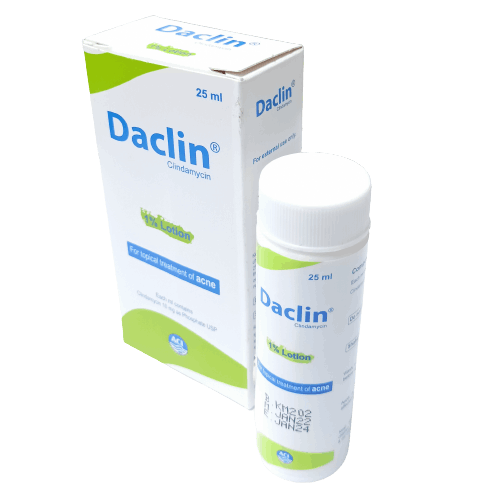
Type:25ml bot
Generic Name:Clindamycin 1% Topical
Manufacturer:ACI Limited
Price:৳125.00
Acne vulgaris, erythrasma, rosacea, periorificial dermatitis, folliculitis, stasis, chronic lymphaedema and familial pemphigus, dermal ulcers.
Topical/Cutaneous Acne Adult: As 1% preparation: Apply a thin layer onto affected area bid.
<12 years old Safety and efficacy not established >12 years: Apply a thin layer onto affected area bid.
Contraindicated in patients with hypersensitivity to clindamycin.
Clindamycin inhibits protein synthesis by reversibly binding to the 50S subunit of the ribosomal thus blocking the transpeptidation or translocation reactions of susceptible organisms resulting to stunted cell growth.
It is not for oral, ophthalmic, or Intravaginal use. Avoid exposure to sunlight and sunlamps. Wear sunscreen daily. Lactation: Excretion in milk unknown; use with caution
>10% Dryness (18-23%),Oiliness (1-18%),Erythema (7-16%),Peeling (7-11%),Burning/itching (6-11%) 1-10% Headache (3%)
Pregnancy In clinical trials with pregnant women, systemic administration of clindamycin during second and third trimesters has not been associated with increased frequency of congenital abnormalities; there are no adequate studies in pregnant women during first trimester of pregnancy; clindamycin should be used during first trimester of pregnancy only if clearly needed Lactation Not known whether clindamycin is excreted in human milk following therapy; however, orally and parenterally administered clindamycin has been reported to appear in breast milk; clindamycin has potential to cause adverse effects on breastfed infant's gastrointestinal flora; if oral or intravenous clindamycin is required by a nursing mother, it is not a reason to discontinue breastfeeding, but an alternate drug may be preferred; monitor infant for possible adverse effects on gastrointestinal flora, such as diarrhea, candidiasis (thrush, diaper rash) or rarely, blood in the stool indicating possible antibiotic-associated colitis Developmental and health benefits of breastfeeding should be considered along with mother's clinical need for clindamycin and any potential adverse effects on breastfed child from clindamycin or from underlying maternal condition
May enhance the action of neuromuscular blocking agents (e.g. atracurium). May antagonise the effects of parasympathomimetics. May competitively inhibit the effects of macrolides, ketolides, streptogramins, linezolid and chloramphenicol. Increased coagulation tests (prothrombin time/INR) and/or bleeding w/ vit K antagonists (e.g. warfarin, acenocoumarol, fluindione).